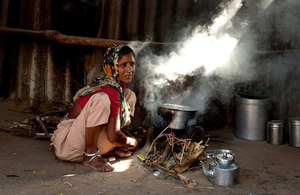Climate change: DFID wins award for clean cooking initiative
DFID funds research to improve women's access to clean energy and quality of life.

Woman cooks dinner for her family on traditional open fire in Gujarat, India. Picture: Romana Manpreet/Global Alliance for Clean Cookstoves.
The Department for International Development has won the “Best Initiative by a Government Body” at the Climate Week Awards, for efforts to enable 100 million households to adopt clean and efficient cooking solutions by 2020.
DFID works with the Global Alliance for Clean Cookstoves (GACC) to improve livelihoods, empower women and protect the environment by creating a global market for clean household cooking solutions. Our support develops research to both understand the problems associated with traditional cooking practices, and expand the development, supply and use of clean cookstoves and fuels.
Lynne Featherstone, UK International Development Minister said:
The health of millions of girls and women in developing countries is damaged every day by exposure to smoke from traditional cooking practices. The innovative research for which the UK government and Global Alliance for Clean Cookstoves have been recognised will improve women’s access to clean energy and quality of life.
The Climate Week Awards, held in London yesterday, celebrate the UK’s most effective and ambitious organisations, communities and individuals and their efforts to combat climate change.
The Global Alliance for Clean Cookstoves
DFID has been supporting the Global Alliance for Clean Cookstoves since 2011. The Alliance is a public-private partnership working towards the universal adoption of clean cookstoves and fuels.
Clean cooking
Around 1.3 billion people globally lack access to electricity and 2.6 billion rely on firewood for cooking and heating.
Every year at least 2 million people die from the effects of burning solid fuels indoors in unventilated kitchens, the majority of them women and children.
DFID’s work with the Global Alliance is delivering high-quality research and supporting innovation to improve the health and well-being of women and girls across Africa, Asia and Latin America. It examines how best to improve the design and performance of clean cookstoves, while lowering the cost for the users. The research also examines how clean cookstoves can reach as many people as possible and have the greatest impact on those who use them.
An example component of this work is the recently created Women’s Empowerment Fund, launched in November last year. This fund provides financial support to innovative ideas that provide women in poor countries with the knowledge, skills and resources to ensure clean cooking solutions are used as widely as possible.
Examples already supported include providing female school cooks with improved cooking stoves and training them in clean cooking techniques and stove maintenance. They are also helped to become clean-cooking solutions entrepreneurs.
Clean energy, girls and women campaign
Energy poverty has a disproportionate impact on the lives of girls and women in poor countries. In November 2013 Lynne Featherstone, UK International Development Minister, launched a campaign aimed at improving the economic opportunities, safety, and health of girls and women through clean, affordable and modern energy.